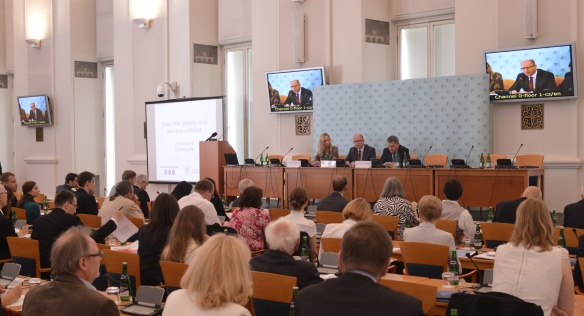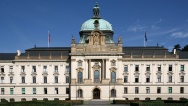Press Advisories
2. 6. 2015 22:42
Czech Prime Minister Sobotka supports gender equality struggle
They have joined a great number of personalities who already support this mission. More information available at: http://heforshe.org/.
The campaign is presented as a part of the conference celebrating the 70th anniversary of the Czech Republic membership in the UN: Sustainable development as a challenge and opportunity; Prime Minister Sobotka opened this conference. The objective of the conference is to support, inter alia, debate on sustainable development and to draw attention to its linkage between national and global level.
Prime Minister Bohuslav Sobotka also met during the conference at Černín Palace with the Assistant Secretary-General for Intergovernmental Support and Strategic Partnerships at the United Nations Entity for Gender Equality and the Empowerment of Women Lakshmi Puri, who is also the Deputy Executive Director UN Women's Directorate.
Prime Minister’s speech at the conference celebrating the 70th anniversary of the Czech Republic membership in the UN: Sustainable development as a challenge and opportunity
Dear ladies and gentlemen,
I am very glad to be able to welcome you here at the conference celebrating the 70th anniversary of the Czech Republic’s membership in the UN: Sustainable development as a challenge and opportunity. The purpose of this conference is not only to look back and celebrate this anniversary but to look ahead into the future and think about how we can make use of the opportunities presented to us by the great wave of modernization, which is increasingly becoming apparent to us today.
We are facing transformation on massive scale in the following decades, a transformation that is comparable to changes in lifestyle occurring during the times of Industrial Revolution. People moved en masse from the country to towns and cities back then. Manual – human – work was being replaced to a large degree by machines. A new wave of yet unknown urban poverty swept cities and nations. Today’s changes will have similarly deep impact on our daily lives, same as the Industrial Revolution in the second half of the nineteenth century.
And it only depends on us whether these changes eventually strengthen our society or make it more vulnerable, all depends on our response and policies that we will be able to make our own.
Global challenges which we are facing now in the 21st century cannot be seen as independently acting phenomena. On the contrary, challenges that today’s world is facing permeate throughout economic, social and environmental spheres. The pressure on natural resources keeps growing. Climate changes and demographic conditions change as well. Economic systems fluctuate and social differences become more pronounced. An enormous pressure grows forcing us to search for new ways to ensure development, which will respect both natural and social limitations.
The methods of facing up to these challenges have been widely debated over the last several years at the UN: as a result, these debates formulated 17 global objectives to achieve sustainable development. These objectives should be adopted by the international community at the September summit in New York.
Any future development must use mutually linked and complex solutions, which can in concert facilitate the desired outcomes. This includes ensuring and providing for the needs of the existing generations but also for generations that will come in the future.
In contrast with the millennial development targets, which governed the world’s efforts roughly between 2000 and 2015, the new sustainable development objectives will allow all countries to address the most pressing challenges whether these concern combating poverty in the least developed parts of the world, or commitments toward reducing social disparities in rich countries. Each country will be able to respond in their own way to these sustainable development objectives. Each country will be able to transpose these objectives in their own way to meet their specific conditions and contribute toward their fulfilment.
Now, please allow me to present an example of a specific UN objective and its transposition to the conditions and realities of the Czech Republic. For example, objective 13, which rests in ensuring of sustainable production and consumption, that is an objective that is highly relevant for the Czech Republic.
The challenges that we facing also include gender equality. We live in a country which gave women the right to vote already in 1918, and where the ratio of women in employment permanently remains one of the highest in world. The equality between men and women remains an actual objective.
Gender equality also concerns, for instance, the question of equal pay for identical work – the statistical data keep showing us that women in the Czech Republic receive for identical work performed by men a mere ¾ of what men take home. Another big issue is the extremely low employment rate of women who have small children. If we manage to provide the right conditions for these women allowing them to return to work, it will liberate their massive potential. All these commitments that we are about to undertake can be met only through emphasis on practical policies and specific measures supporting this shift.
A good example of another policy facilitating the necessary shift is the creation of the Green climate fund, to which Czech Republic contributes, which attempt to mobilize means to effect transition to low-carbon economy, which is crucial to combat climate change. This is where the main challenge lies within the new global development framework. We must however be fully aware of the intensity and cost of this entire process and involve all sectors of the society simultaneously.
The cost of transformation to low-carbon economies is being estimated at several hundred billions of dollars annually. Such volumes of funding cannot be provided any longer through the existing development aid mechanisms. And for this reason, the new agenda counts on, among other, intensive involvement and mobilization of private funding.
The private sector has already responded to some of the risks and challenges that we will face in the future. Big international corporations as well as smaller firms have been searching for opportunities that will allow them to prosper in the new low-carbon economic environments and offer suitable solutions to resolve given problems.
The political class and the state administration must bear the responsibility and not underestimate the power and influence of technology change that greatly influenced the economic and technological development in the previous years, such as the never-seen-before development of mobile communications and the internet. Our ability to become involved in the process of technological change and to use this technological development to drive economic change will be decisive.
I consider the energy sector to be the key sector in this effort. The growing importance of renewable sources, smart grids, decentralized sources and the anticipated progress in the area of energy storage, all these must be integrated within the new energy framework, and we must be directly involved in these changes and be able to profit from them.
The German-lead shift within the energy sector, that we can observe “live,” so to speak, across our borders represents one such opportunity. This vision must however ne shared by the entire society so we are all able to improve, using technological excellence, the quality of life in the Czech Republic.
Czech Republic is not a remote island lying outside the influence of global trends. Sustainable development objectives cannot be seen only as an external force that we need to respond to, because everyone else is already responding. These objectives present to us a unique opportunity to tie the global efforts to achieve sustainable development to our own domestic efforts and to domestic decision-making on the direction that the Czech Republic will follow in the future.
We must be able to find an appropriate bridge between the national and global dimension of sustainable development. We cannot afford any longer to think in terms of profit and loss only within the framework of one country, without taking the rest of the world in account. A typical area, where no country can pretend to be an island anymore is climate change.
A profit or loss for one country in the global environment may well become a loss for all. One of suitable instruments to transpose these global Sustainable development objectives to national level is represented by the Strategy Framework for Sustainable Development of the Czech Republic, whose updated is currently under way.
We need to outline the possible routes that future development may present to us and to choose, through the widest possible debate of experts, politicians and all concerned citizens of this country, which way the Czech Republic should take.
Only in this way we will be able to reach a shared vision, a vision which will guide us in the future. And the whole-hearted adoption of this vision by the general public will be the crucial moment. Involvement of the society as a whole, of the professional and lay public alike in the decision-making processes provides us not only with high-quality information on the impact of decisions this government takes, but also increases the potential that the public itself will act as proponents of these changes.
Ladies and gentlemen,
We stand on the doorstep of epochal change. It is only up to us to evaluate problems that we face, that appear to be most pressing, and find adequate response to counter these problems and to provide answers to our needs and to the needs of those that will come after us. We must discuss and decide what route of progress we choose for the future. We desire inclusive growth, a growth that ensures improvement in the quality of life for the largest swathes of all citizens. We desire a smart and green growth, one that is based on economy providing high added value and one that will build on the tradition of Czech excellence in using the most modern technology. We have good potential for all this. We must learn how to employ this potential to the full extent. And that is truly the task that we are facing.
I am honoured to have the opportunity to commence tis conference.
Bohuslav Sobotka, the Prime Minister of the Czech Republic







